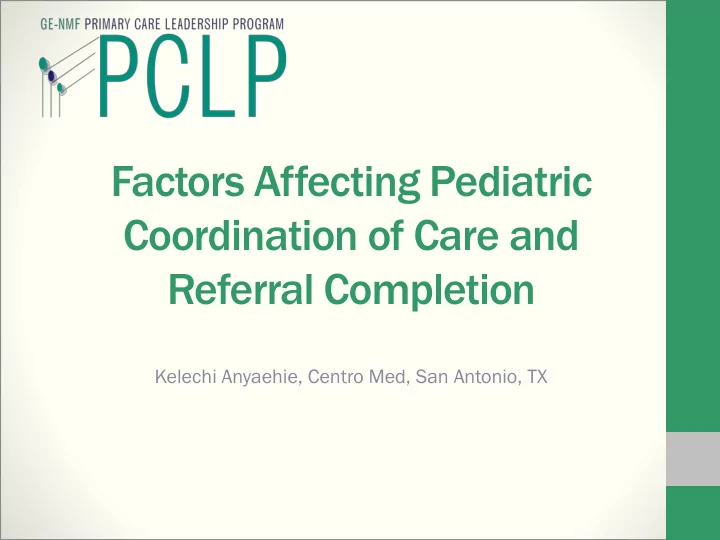

Factors Affecting Pediatric Coordination of Care and Referral Completion Kelechi Anyaehie, Centro Med, San Antonio, TX
Introduction • I began this PCLP experience with an interest in assessing the patient experience and the coordination of care among primary care physicians and specialty providers. Coordination of care applies integrating all of a patient’s health care needs within the primary care setting. The purpose of this project proposed to look at the elements of coordinating care between Centro Med, a CHC, and other specialty clinics. The goals of this project were to provide examples of how coordination of care is approached at this site and to provide recommendations for improvement. As the project developed, I wanted to look further into referral completion rates for tangible data in assessing how the referral process affects the coordination of care.
Background • Coordination of care is a very important concept in the primary care setting, which serves to integrate all of a patient’s health care needs inside and outside the PCP office. When there is poor coordination, the potential for missed diagnoses and treatments, repeated testing, and patient dissatisfaction are more likely to occur (Forrest et al 2000). This increases medical costs and wastes resources. • In one study, Williams et al. proposed 3 coordination events essential to the referral process 1) the referring physician communicates reasons for the referral and relevant patient information, 2) the specialist completes and communicates findings to the referring physician, and 3) the referring physician, the specialist and patient negotiate continuing care (Forrest et al 2000). • The effectiveness of specialty referrals as a tool of patient management depends on the physician’s plan and the likelihood of the patient completing the referral (Forrest et. al 2007). Breakdowns in the referral process can lead to lower rates of referral completion amongst patients who really need specialty services. • This study aims to identify and highlight some of the factors that affect the coordination of care and referral completion process amongst pediatric patients at Centro Med Walzem in San Antonio, Texas.
Methodology • 18 pediatric patients were surveyed in 8 days over 4 weeks during the morning sessions at the Centro Med Walzem site • The survey was only given to patients referred to a specialist at the previous visit within the past 6 months. • A referral was defined as those patients sent to specialists, physicians and non-physicians, and resulted in an in person encounter. Referrals to laboratory and imaging centers were excluded • Patient questionnaire- demographics, specialty referred to, form of contact and completion of referral. • Physician questionnaire- type of specialist referred to, reason for referral, patient insurance, whether the physician or staff made the referral, and if relevant information was passed to the patient about the specialist
Results Reason for Referral Frequency Percentage Second Opinion 10 56% Specialized Skill 5 28% Parental Request 3 16% Reasons for Incomplete Referrals Frequency Percentage Diagnosis disagreement with 1 25% physician Patient did not receive a call 2 50% Social factors (transportation, work, 1 25% etc)
Results (cont’d) Specialist Referred To Frequency Percentage Medical 5 28% Surgical 0 0% Mental/ behavioral health 8 44% Non-physician 5 28% Coordination Activity Frequency Percentage Referring physician/ staff scheduled 17 94% appointment Physician aware of referral 12 67% completion Referring physician received 11 61% feedback from specialist Referrals completed 14 78%
Discussion • Only 78% completed physician referrals, therefore there is still room for improvement in the quality of the referral process. Increasing efforts amongst both primary care physicians and specialists can positively affect the referral process. • Half of those who did not complete referrals occurred because they did not receive an expected phone call. Centro Med has an electronic referral system that allows the primary care physician to refer through a tab in each patient’s medical record. Thus, more studies should look into the effectiveness of electronic referral systems. • 61% of the time, the physician did not receive feedback from the specialist. The primary care physician depends on specialists’ referral completion letters, which usually discuss plans for treatments and suggestions, to be uploaded in the patient’s chart. • A care coordinator plays an essential role and lightens the administrative demands of the referring physician. Centro Med Walzem now has a pediatric care coordinator that helps with coordinating referrals amongst different specialists. • Limitations- This study did not focus on the referring physician’s satisfaction of the referral process, the perspective of the specialists or the evaluation of the patient’s experience with the specialist
Recommendations • Referral completion awareness could be improved with an electronic medical record that is compatible with updating the patient’s primary care records once a specialist appointment has occurred. • An electronic system that could notify physicians when an appointment has been completed or canceled could help with having all encounters documented for any needed co- management of care. • Continue to assist patients with making their appointments • Physicians and care coordinators should implement a system of following up on completed referrals once they occur. • Engage the patient in scheduling the appointment. The coordinator can help with finding the best time for calls or better days for appointments.
Conclusion • In conclusion, the referral process involves the relationship between the referring physician, specialist and patient. The decision for referral is very common in primary care, however the referral process continues to present many challenges. • This study shows that, the completion of referrals depends on many factors of the referral process. • Suggestions for increasing referral completion include helping patients scheduling their appointments, engaging them in scheduling and continuously emphasizing the need for their responsibility and continuity of care.
Acknowledgements • Dr. Norma Parra • Jackie Lewis • Yahaira Carillo • GE-NMF PCLP • Centro Med Walzem • Dr. Soheir Girgis
Recommend
More recommend